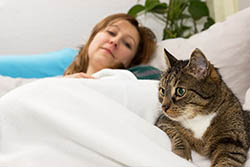Do Your Clients Know When Their Pet Is Distressed?

Sometimes changes in a pet’s behavior signal the onset of a health problem. Since animals aren’t seen by their veterinarian on a daily basis, it is up to their owners to remain vigilant to watch for any signs that could indicate the pet is in distress.
The following information identifies signs that should be watched for closely as they could be pointing to a health problem. Make sure your clients know that if their pet is observed with these symptoms, they should bring the animal in immediately.
Signs of Pet Distress
Abnormal Breathing
When exercising or at play, it isn’t uncommon to see an animal panting heavily or breathing at a faster rate. Then, when at rest, their breathing becomes more regular. Are your clients aware that abnormal breathing may indicate the animal has a health condition that requires veterinary care?
When an animal is showing signs of respiratory distress, their breathing may be:
- Rapid
- Labored
- Noisy
- Croupy
- Wheezing
- Shallow.
Vomiting or Diarrhea
Both cats and dogs eat things they shouldn’t, and they probably eat more than anyone is even aware of! If what they eat causes them to purge, it usually isn’t a problem. When vomiting and diarrhea are indications of a medical issue, the animal’s symptoms may also be accompanied by signs of lethargy and a loss of appetite.
Remind your clients that when vomiting is observed, they need to look for:
- Blood in the vomit
- Vomit that resembles coffee grounds, a sign of dried blood
- Foreign objects that have been ingested that may have irritated the stomach
- Parasites.
Emotions sometimes cause an animal to have diarrhea; for instance, if they become excited to go on a car ride or if they become upset at being left alone. Have you informed your clients that an animal experiencing chronic or recurrent diarrhea should be seen by a veterinarian?
Loss of Appetite
From time to time, an animal may turn its nose up at whatever is in its dinner bowl, but being picky once in a while isn’t a cause for concern. Do your clients know that if an animal refuses to eat for more than 24 hours, the veterinarian should be contacted?
Decreased Activity
Most pets are actively interested in what is going on around them. If a naturally energetic and playful pet suddenly becomes sedentary and lethargic, this change in their behavior may indicate that they are ill or are in pain from an injury.
Changes in Bathroom Behavior
Problems with urinating are often a sign of distress. Do your clients know that when a pet begins urinating more or less frequently, the animal needs to be checked by a veterinarian? Issues with changes in bathroom behaviors include:
- Straining to urinate
- Inability to urinate
- Blood observed in the urine
- Changes in their wetting habits, for example:
- Wetting inside the house
- Urinating outside of the litter box
- Urinating on furniture or into a sink
- Increased need to go to the bathroom during the night.
Behavioral Changes in Geriatric Animals
As pets get older, they often experience changes that are directly related to aging. Geriatric animals tend to become more restricted in their activities as a result of diminishing physical abilities. Behavioral changes caused by age may include:
- Loss of energy – animal becomes more sedentary and sleeps more
- Decreased interest and curiosity
- Less tolerant of temperature changes
- Temperament changes – animal may seem cranky and becomes less tolerant of other animals or children.
Because these changes are related to aging, outside of suggestions for keeping the animal comfortable and happy, they do not require immediate veterinary care. However, advise your clients of these signs that a geriatric animal is in distress and should be taken to the veterinarian:
- Loss of appetite or weight
- Respiratory distress
- Coughing
- Increased thirst
- Increased urination
- Constipation or diarrhea
- Increase in temperature.
Changes in behavior are often signals that a pet is in distress. While it is up to their owners to watch for them and notify the veterinarian that help is needed, as a veterinarian, you can inform clients of conditions that require immediate action.
Careers
Are you looking for a place to let your talents shine? At Covetrus, we help our practitioner customers better serve their patients and take pride in providing the best customer experience possible. Search our open positions to see our available opportunities.
Newsletter
Stay current with what’s going on with Covetrus, subscribe to receive our newsletter and email communications. Subscribers will receive the latest information in practice management, sales and marketing, animal health, and more.


Leave a comment